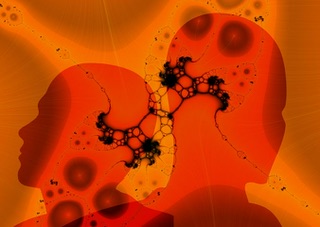I have long loved the energetics of words. Each word we utilize has a purpose, an energetic shape and way it weaves into our collective: our community, society, world. Language and words are not static beings; they evolve as we interact and intersect with them.
Many words in the spiritual sphere become broader as they become more popularized. Kundalini is a good example of this. It sounds important, like something many people want to grasp onto, to claim as their own, without recognizing what the experience of a kundalini awakening may truly look like.
I find that this is not an act of malice, but rather of ignorance. There are many who simply do not realize that something spiritual can happen in the modern world. More commonly, discussion of “psychic abilities” or even spiritual methods and tools may lack awareness that there are such things as spirits or that we can interface with some aspect of divinity (or oneness) directly.
There is a larger and deeper purpose to this, as when movies, books, and other popularized media talk about “spirituality”, “shamanism”, “spirits”, “spiritual awakening” as if they were a fevered dream, rather than a part of our reality that many simply ignore, it upholds our cultural values and the considerable beliefs that come along with our collective identity.
Put more simply, if we were to truly understand that the spiritual layers of reality are, in fact, real, we would need to confront death and our treatment of the natural world. That is too terrifying, or too sad, for most of us.

The other day I got into a discussion with someone about Adi Da. People sometimes question my suggestion of his book, Knee of Listening, in my book list (I offer book lists at the end of some of my books, this one was for my book Working with Kundalini). It was a fairly popular book in the 1970’s and early 1980’s.
When reading this book I found it to reveal insight and consciousness that very few spiritual autobiographies attain.
However, Adi Da then went on with his life, telling others that only he had achieved the level of attainment he had and that it was beyond the Buddha. Then came a history of misogyny and abuse, such as telling women to “give up their attachments” by sleeping with him.
There is a long list of “spiritual teachers” who have have sexually abused seekers in search of “enlightenment”. Until a student has moved beyond a place where they are seeing their teacher as Demi-god, or Other (dehumanized, albeit in a positive manner) any sexual activity (including instructions to have sex with other students) is a form of power theft, rather than conferring any type of power.
If a person if fairly conscious, it is quite clear and easy to see that people in the “seeker” category are looking for a pseudo mother/father figure to heal basic childhood wounds and have not yet found authority, light, and an adult-orientation towards reality within themselves. It takes time and awareness to help people break people out of this type of seeking (and is a big reason why traditional systems that are “sex-oriented” like Tantra do not introduce sexual contact as part of their introductory curriculum).

It is typical of people to discuss, lament, or even perhaps joke about beginning students who are stuck in Dunning-Kruger syndrome. We so often believe that we have achieved some great knowledge or attainment when we simply do not yet have the wisdom borne out of education and life experience to show us the vastness of what lies beyond where we currently are and what we currently know.
We so desire to be large on the spiritual path: to be special, to be seen, to be validated, to have mastery, that becoming a small star in an ever-widening sky is fought against valiantly. If we do allow ourselves to experience that sky becoming larger, and ourselves becoming smaller, the embodied experience of it is such an overwhelming relief.
We can let go of the pressure of becoming and achieving and the desires for fame, status and visibility that create so much pain and confusion in our lives.
It is a lot to ask anyone to let go of beliefs that spiritual awakening will offer fame, wealth, or status. It is an even further leap to suggest that at some point that it doesn’t particularly matter what our titles or status are, as the need to find our self-worth in them ceases and that we can find just as much value helping a single person, or a smaller community, without notoriety.
It is also typical for those of us who have completely moved beyond the beginning stages of our path to smile at our former selves that were once in this stage. Others may fight, mock, or belittle, continually battling against the part of themselves in the outer world that is still stuck in these beginning stages. It is so common to believe ourselves to be so much further than we are, yet nobody in this stage recognizes how entirely common it is, as the sunlight of awareness has not yet softened the edges of the ego to see others and to put ourselves in another’s shoes.
We are so disconnected at the beginning of our path that we can be in a room of fellow lonely souls with the same interests and pain as we have and not see our commonality. In many ways spiritual awakening can be described as moving out of this state of disconnection into greater and greater connection: to ourselves, to other people, to the world, to the divine/natural world, and dissolving the beliefs, protective and defense mechanisms, and ego-based needs that separate us.

It is typical for many to remain in beginning stages of awareness. This is a result of paths that seek escapism and intellectualism, and shy away from embodiment and the suffering present in reality. It is only by awakening through our bodies that the reserves of pain, incorrect beliefs, fundamentalism, and egotism of the self can be cut through. It is through this cutting that the golden light of reality can permeate, and the way we see ourselves and reality can change.
Put more simply, it is easy to utilize spiritual paths to disassociate, rather than connect further. To look away rather than look towards. In the modern world, a type of casual nihilism is pervasive, where the spiritual aspirant becomes locked in a state of meaninglessness and disconnection, never recognizing that the superiority they espouse about how nothing matters is simply a really sad way to live your life, never mind has nothing to do with being physically, mentally, or spiritually well or conscious.
When we move into a state of recognizing just how much everything matters, just how precious everything is, we can move into a state of being found and having sought, rather than still seeking and still proving our worth to others.
I mention Adi Da because it is easy to point out the beginning student stuck in a stage like this because there simply are so many of them.
What is much harder to recognize is that later stages of the path come with their own barriers to break through.
One of the largest is that when there is enough space between your consciousness and the sort of median consciousness of humanity to not utilize that to fuel the very human tendency towards narcissism and megalomania.
We all have parts of ourselves that desire to be seen, appreciated, heard, and to feel the totality of our own power.
Often these are covered up by the lessons of life that have taught us to become invisible, to be humble, or that spiritual attainment has to do with some type of moral perfection.
Within each person that comes to me, at a certain stage of their path, questioning their own self-worth… asking if they are worthy of the blankness, ecstasy, awareness, or flows of energy that they are experiencing… lies a secret twin. The polar opposite, the part of us all that secretly wishes to be (or believes that they are) special, a genius, a prophet, or desires to be seen through the eyes of adoration.
This is the shadow part to our feelings of being unworthy, and they magnify as we awaken. We paradoxically see ourselves as being unworthy and yet know deep down, but cannot admit, that we see ourselves as special, enlightened, or a prophet or other figure worthy of regard.
To recognize this shadowy twin is a feat in and of itself. To integrate it to the point where we can come down off of our peak and find validity in being a simple, ordinary human being is another thing altogether.
How we integrate this megalomaniac, narcissistic shadowy twin is to acknowledge it as a part of us, and to accept it fully as a part of us. It is only then that we can move past it. When the worthless parts of ourselves meet the parts of ourselves that are convinced of their superiority and specialness, this part of us dissolves, and we no longer need to act out this conflict in our lives.

It is entirely possible to be quite conscious and to also have enormous moral failings as a human being. While many of us can make it beyond the initial steps of the path, where the need for patience, effort, experience, and discipline on the spiritual path are recognized, it is much more difficult to pass through later gateways of self.
The test is always the same, and the moment we start to question if we are beyond such things is the very moment where we should ask ourselves if we are being tested. This test isn’t from some taskmaster, or divine authority figure, it is a testing of and by our own egoic structure.
On a spiritual level there are no “tests” but to the ego there very much are. Our ego will choose to expand or contract based off of the tests it creates for itself.
To “pass” such a test is to let go of anything that separates you from being a simple, ordinary human. To look at anything that is preventing you from living your life fully.
It is such a simple test– such deep spiritual truths always are– but it will reveal which parts of ourselves still revel in the idea of being different and separate and require the outer world to reflect back that we are different and separate and special.
Such a test allows for us to release the idea of mastery, power over, and even the designation of being “enlightened”, “awake”, or “conscious”.
Enlightenment is a label of separation. It designates one as superior, different than than “common” human.
The argument against this is the recognition that all of us, on some level, are “awake”, but only some of us recognize it. However, if you look at how this label is used popularly, it reveals itself and its purpose.
In the act of using such labels: enlightened, awake, mastery etc. there comes to pass a purposeful intention– to repeat a play in which one is the teacher and other is the student. To show the world, and ourselves, that we are worthy.
To reveal a loop (repeating pattern of behavior that shows trauma or false/harmful ways of being) in which the master reveals their wisdom to those without mastery, or to identify with being a person who has attained some wisdom, some enlightenment, that they are now offering to others.
On a practical level, this is how teaching occurs. Someone studies something, practices it, embodies it, and helps others along the same path. That is a beautiful path, and much needed in a world where so much disconnection presenting as spirituality abounds.
But on a spiritual level, the stories that we feel the need to tell others to show how special we are reveal an inward pattern of worthlessness and need for inner validation that still needs to be addressed.
If we let all of these labels go, and the stories behind them, we can discover our worth arises simply because we are an ordinary human being.
This desire for being seen and being special fuels this loop, and until there is the question of why do I need to be awake, enlightened, superior, special, etc. or identify myself that way to others (so as to ensure that they are inferior, less than, etc.) there may be conscious awareness but not yet a passing of the test that would allow the person to move through further gateways of the self.
Passing beyond those further gateways allows for a return of simplicity, to a life where spirituality is but a footnote in a life well-lived. In this space we can simply live out who we are, without the need to utilize it to prove something to ourselves… or to others.
Mary Mueller Shutan is a spiritual teacher and author of several books, including Working with Kundalini, The Spiritual Awakening Guide, and Managing Psychic Abilities

Totally agree, Paul. I do find the focus on emptying and deconstruction of self necessary, but as you said at a certain point there needs to be focus put on adding, rather than subtracting… otherwise, the sort of nihilism I speak of is a common result. Thanks for sharing!
Misery fueled the desire to untangle myself. Had no idea it was a package deal.
If someone purges enough, nihilism is a likely result. The cup is completely empty. This is a turning point, where the cup can be refilled with bigger and better things. Nihilism was actually an important part of the overall process.
Getting stuck in nihilism is a special kind of hell all it’s own.
Hi Mary.
I feel you have a point here. Its important to realize the unimportance of oneself, and how no person is special or better, and return to our humble, everyday selves.
At the same time, I would say that your perspective comes from a person who has made a lot of cultivation in a lot of lifetimes, likely. As a person like that, really called to magic/spiritual work… even when you return to your normal life, you will always have magic in your life. Its who you are, for the amount of cultivation you did, in a long long time. But for others, who feel called to magic, occult arts, or spiritual work… and that we arent that much psychic or magical in this lifetime, but we are only beggining… we need to make sacrifices, have a lot of discipline, and have a lot of cultivation. This is not for being special, nor for being defficient… its just because we dont have that level of muscles/power that a person who has made a lot of effort in lot of lifes had made. This its not about putting natural spiritual workers or magicians or adepts in a pedestal, but about seeing the perspective of the people who are “in between”. Not yet a person who is naturally magical, not yet a person who can fit 100 % in society. A lot of those lifetimes (when you are not quite yet, but you have a tendency that guides you to magic) tend to need a lot of sacrifice, hard work and cultivation… and then, you find you have difficulty fitting in society, even when you connect to others. You have troubles finding partners, etc, troubles guided by the nature of your own path or future path… This is normal… and in the moment you are experiencing that stage, you feel bad, or invent myths about being special, etc. Those are just myths, yep. But at the same time, discipline and sacrifice in some lifetimes, for people who are not “there” yet, is necessary, for becoming a decent spiritual worker o magician at least in 2 or 3 lifetimes… It sucks but its a need. At least thats my tiny perspective. And again, this is not about pedestals or nothing like that. Its seems like its just the way things are… Sacrifices in some lifetimes, for natural good start in magic in the next ones… Have a nice weekend!
Thanks, Dina. Good luck with your business!
Yes, yes, yes to all of this. Thank you for finding such poignant words for an experience I’m grappling with. Particularly as a new business owner in the online coaching world who has been coaching for a long time but is new to the online part.
Your words help me ground back into myself and remind me that what I am experiencing can be trusted.
Thank you for being an open to channel to this wisdom